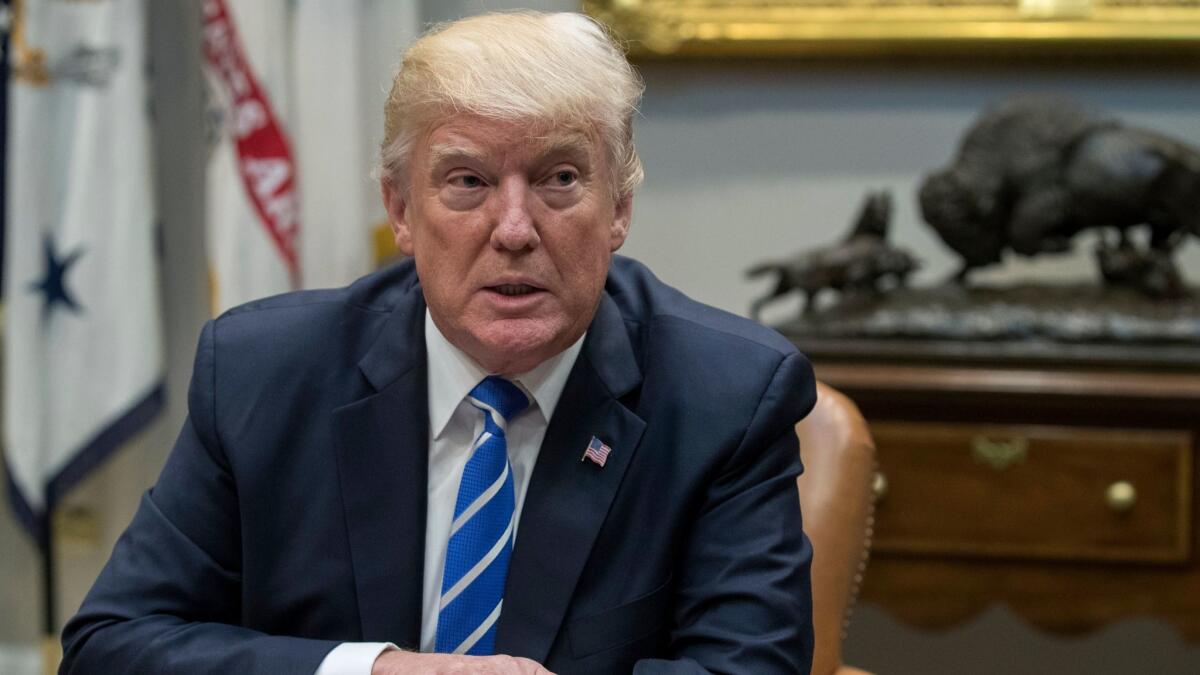Column: Trump’s DACA decision passes the buck to Congress — for now

At President Trump’s rallies, he’s usually flanked by a pair of big blue placards displaying his administration’s proudest boast. “Promises Made,” says one. “Promises Kept,” says the other.
On the surface, keeping his promise to rescind the Deferred Action for Childhood Arrivals program, or DACA, which suspended deportation of young immigrants who were brought into the country illegally, should have been simple. Deporting “Dreamers” was part of Trump’s tough immigration platform. “They have to go,” he said in 2015.
But somewhere along the line, the president seems to have had second thoughts. Maybe it was the well-scrubbed group of Dreamers who visited him at Trump Tower last year or a plea from his daughter Ivanka. “We love the Dreamers,” he said only last week. They should “rest easy,” he said in April.
So when the moment of decision arrived this week, a president who likes to portray himself as decisive tried to have it both ways. To use one of Trump’s favorite words, he choked.
If Congress falls short on repealing DACA, President Trump will blame the legislators, just as he did when they failed to repeal Obamacare.
His words, aimed at immigration hawks in his base, were still tough. Lax immigration policies have produced “lower wages and higher unemployment for American workers,” he charged, “yet few in Washington expressed any compassion for the millions of Americans victimized by this unfair system.”
But his real decision was to pass the buck. Trump dumped the problem in Congress’ lap and told lawmakers to fix it. Lest there be any confusion about whose responsibility the program now was, Trump tweeted, “Congress, get ready to do your job — DACA!”
To give Congress time to act, he deferred implementation of his order for six months. That, apparently, was the “humane” dimension his aides had promised: The roughly 800,000 young people currently covered by DACA have a shot — if the bureaucracy works properly — at keeping their protected status for up to two additional years.
But after that, an administration official told reporters, they’ll be just as deportable as their parents. And no new applications will be considered; toddlers whose papers haven’t been filed are out of luck. That’s more humane than scrapping the program, but not by much.
Trump wasn’t very humane toward Republicans in Congress, either. DACA is their problem now. And it’s part of the larger immigration issue that has divided their party bitterly for most of a decade. Immigration may be the hottest of the hot-button issues that pit GOP populists like former Trump aide Stephen K. Bannon against establishment figures like House Speaker Paul D. Ryan.
One official compared Trump’s decision to rolling a grenade into the Capitol. If Ryan tries to bring a DACA bill to the floor, he’ll face an instant revolt from the conservative House Freedom Caucus. Trump’s six-month deadline comes up next March — when Republican primaries will be heating up. That will make it even harder for GOP moderates to risk looking soft on immigration.
The irony is that there’s probably a bipartisan majority in both houses for turning some form of DACA into law — in principle, anyway. Democrats want to do it. So does a minority on the Republican side, not only mavericks like John McCain of Arizona and Lindsey Graham of South Carolina, but also a few rock-ribbed conservatives like James Lankford of Oklahoma and Jerry Moran of Kansas, judging by recent statements.
But it’s a polarizing issue that’s guaranteed to divide the Republican majority. To pass a bill, they’d need support and political cover from their president. It’s not clear that they’d get it.
On Monday, Trump’s attorney general, Jeff Sessions, came down hard on the other side, against a renewal of DACA. The program, he charged, had “denied jobs to hundreds of thousands of Americans” by giving Dreamers work permits. That wasn’t an endorsement.
Besides, Congress has an impossibly long to-do list already: It needs to act on the debt ceiling, government funding, a budget, hurricane relief, tax reform and healthcare. It will be much easier not to act on DACA. (Congress is good at that.) And if Congress doesn’t act, DACA expires.
Here, in a final irony, is what happens if Congress falls short. President Trump will blame the legislators, just as he did when they failed to repeal Obamacare. Then, as DACA’s expiration date approaches six months from now, the problem will head back to the White House — straight for the president’s desk.
If Congress can’t fix DACA by March 5, there’s no legal reason Trump couldn’t extend the program again. He’ll face the same decision he tried to duck this week. By then, it will be a congressional election year, and the voices on both sides will only be louder.
So the president has escaped his DACA dilemma, but it’s only a temporary respite. As often happens when an executive ducks a tough decision, Trump hasn’t really solved his problem — or his party’s. He’ll simply have to face it again, all too soon.
Twitter: @DoyleMcManus
Follow the Opinion section on Twitter @latimesopinion or Facebook
ALSO
Trump’s phaseout of DACA is facing legal challenges
What’s next for DACA and the nearly 800,000 people protected by it
Trump said he would turn the GOP into the party ‘of the American worker.’ How’s that going?
More to Read
A cure for the common opinion
Get thought-provoking perspectives with our weekly newsletter.
You may occasionally receive promotional content from the Los Angeles Times.







